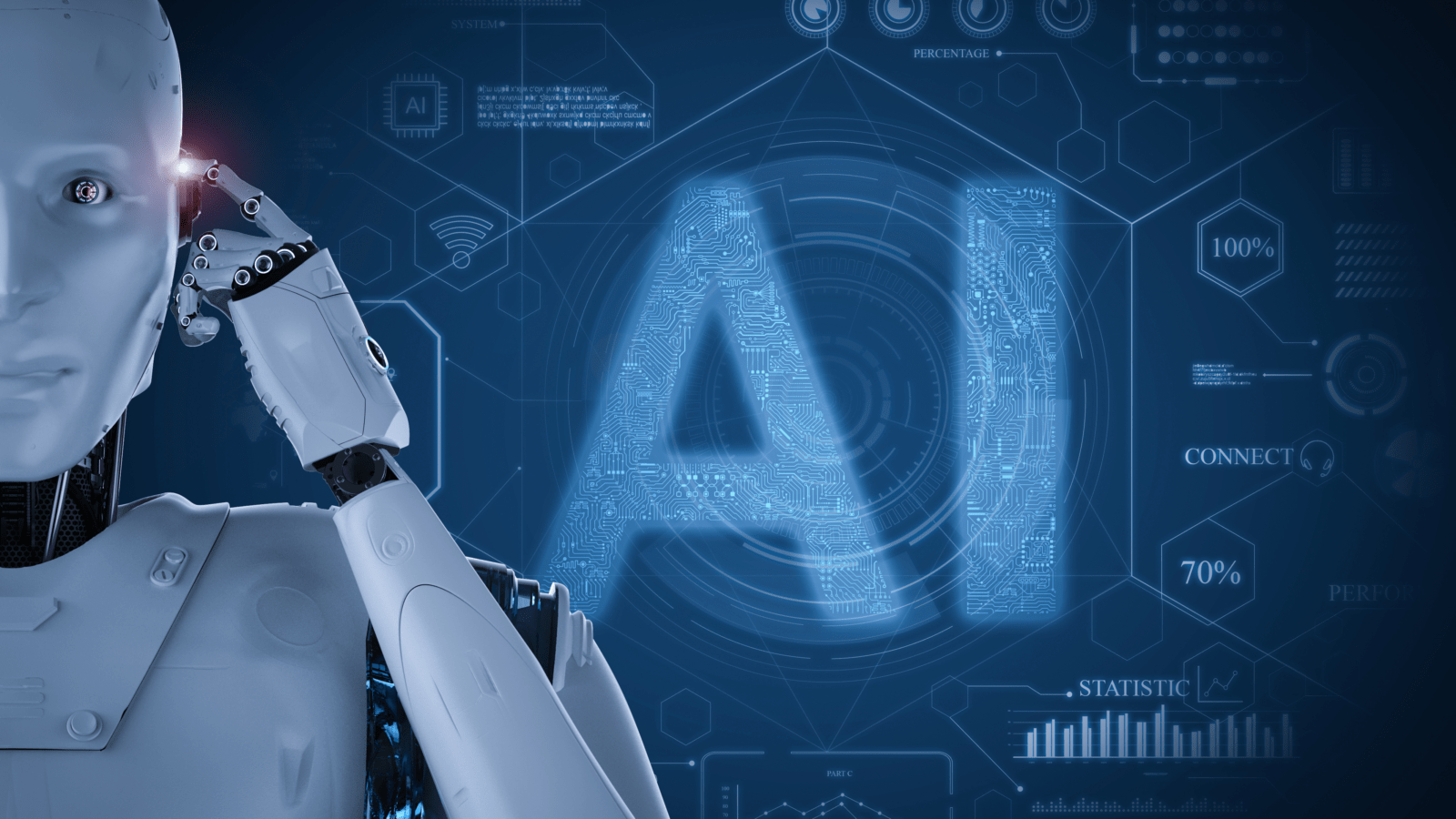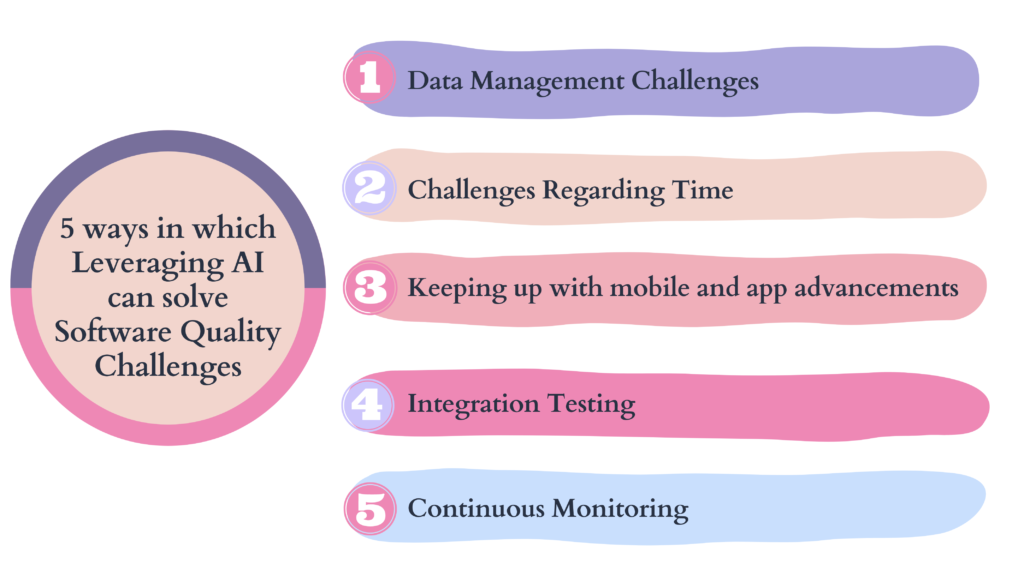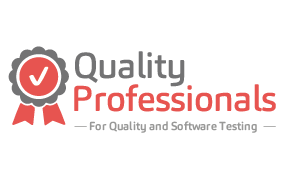
5 Ways AI is Solving Software Quality Challenges
Over the past recent years, software testing approaches became more complex to keep up with the constant advancements in software development practices and with the nature of digital services in general. As is the case in all industries, AI (Artificial Intelligence) and ML (Machine Learning) are shaping up new ways to speed up the production process and assure more accurate results. So is the case with software testing.
AI solutions can not only scale up the level of productivity in all aspects but also solve issues that seemed inherent and unavoidable. In this article, we will discuss 5 ways in which Leveraging AI can solve software quality challenges, and how we at Q-Pros look to adapt such practices to further enhance our services in the world of QA.

#1 Data Management Challenges
Data gathering and documentation are at the core of any QA process. How well we manage our data decides the level of quality we seek to achieve. One problem testing engineers have struggled with over the years was data management. The amount of data being generated from the software development phase can be enormous. This amount of data can be so huge, that it can be impossible for human brains to fathom. This data includes:
- Values and parameters
- Environment data
- Build Data
- Data production and data coverage
Giving this type of data a proper and accurate analysis can only be done by leveraging AI utilities. Relying on smart AI methods can secure better results in all software development phases, specially in the testing stages. It is likely that humans might fall to errors and get overworked while trying to comprehend enormous amounts of data.
One crucial factor in assuring top quality is to collect data from end-users, and by doing so, it helps the dev team decide on what should be tested based on data gatherings and test configuration and combination.
Test configuration can amount to millions of potential scenarios, and data-driven tests are essential to the testing process only running this data through smart analysis allows the testing teams to narrow down the number to prioritize the most valuable tests.
#2 Challenges Regarding Time
Organizations are constantly looking for ways to drive the Dev-Ops process even faster, and relying on smarter methods can further drive the cycle even faster and ensure better quality at the same time.
While Agile methods can result in more organized and accurate outcomes, they can also take a heavy toll on the dev team. We must produce test configurations and test, and then the dev team must make the changes and wait for another testing cycle or sprint to ensure that no further changes are needed regarding the scenario at hand.
Speeding this process and ensuring the same if not better quality of results can only be done via smarter AI solutions. By analyzing quality trends and assessing code-changing risks, developers can then plan for better more efficient sprints.
#3 Keeping up with mobile and app advancements
With the current state of exponential growth of mobile devices and mobile application services, it is getting more and more complicated for developers and testers to keep up.
Most Mobile Operating Systems (OS) come with an SDK (Source Development tools) which are used to create native programming languages that are suited for each OS and each device. This accounts for many combinations which are still unstable as things are changing fast.
Leveraging AI in the testing process can simplify things and assure the inclusion of all modern updates.
#4 Integration Testing
Within the Agile structure, QA has become a bottleneck or a speedbump. This is because while it is an essential step, there is little that can be done when it comes to constant updates and changes, we need to constantly test with each change! And while software development is shifting more to the front-end, testing on the front-end could be fragile. That is why we need to make the most of the AI to run more integration tests.
#5 Continuous Monitoring
Existing new possibilities lay ahead in the world of software development, and it is only fair to extend the same level of advancements to the world of testing services. In future years, we will begin to see automated functions running in the background always analyzing every level of code.
The Use of AI can help establish the foundation for such continuous progress as it is difficult for human labor to keep track of every degree of development.
Cognitive Automation
As mentioned, one challenge facing software testing is our need for continuous testing. Doing so allows us to confirm expected behaviors and check for any changes or anomalies. This task is better done through AI, and we could allow automated tools to adjust and customize themselves to perform this process.
QA engineers must harness the benefit of AI and make use of every viable way to automate the testing process, this allows for more time for creative thinking and planning for more tests and areas to serve the overall project.
The need for human intervention in software testing will always remain, the key is to adapt and collaborate with automated means, and not to eliminate one on account of the other.
For as long as the software is designed to be eventually used by humans, the need for human testers will only grow more as applications are getting bigger in scales of usability.
AI Testing and Shifting Left
In recent years, and with the emergence of such work models like agile and DevOps, testers started shifting left, which means testing is now becoming more present in the initial stages of development.
The role of AI in shifting left is that it asserts cooperation values and by doing so allows the development teams to co-exist and align better with the testing team.
One way to deliver better quality to the product is to involve the testing team in more stages, such as early planning and sprint execution.
Q-Pros
Q-Pros is a leading IT company that provides testing services at all levels, we at Q-Pros rely on manual and automated testing methods and tools to assure the best quality for our clients. We plan and strategies testing plans custom-made and crafted for our unique clients.
The role of AI is eminent, we strive to lead the way in innovation and creative testing.
Read more on how we plan to leverage AI in software testing.
In Conclusion
Software testing involves a set of unavoidable challenges. It comes down to either working hard or working smart; while we intend to do both, it is of extreme importance to remain on top of modern advancements.
Establishing good foundations with AI and ML tools is a huge asset for software quality. Automation allows us to analyze data in real time. Through AI we gain more information from data builds, code changes, and test history, narrowing down thousands of possible configurations.
By empowering the testing team through Automated tools, we receive better and quicker results.
Online Test Request

